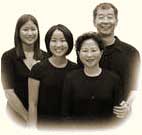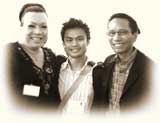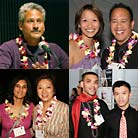 |
|||||||||
|
|||||||||
 About the Banyan Tree ProjectWhat is the Banyan Tree Project?The Banyan Tree Project is a national social marketing campaign to stop HIV/AIDS-related stigma in Asian & Pacific Islander (A&PI) communities. We live in a world that does not always treat people living with, and at risk for, HIV/AIDS with respect and dignity. In our communities, this type of discrimination prevents A&PIs from getting tested for HIV and from getting health care and other services they need to stay healthy. The Banyan Tree Project is about: EducationWe are teaching A&PIs about how HIV/AIDS and HIV/AIDS-related stigma affect our communities.
Rooted in AcceptanceWe are building a community free of stigma – where A&PIs affected byliving with, and at risk for, HIV/AIDS feel safe, respected and accepted.
Access to ServicesBy reducing stigma, we open the door for A&PIs living with, and at risk for, HIV/AIDS to get tested and get health services, including treatment, care and support. EducationThroughout the year, organizations and individuals all over the country get the word out about how HIV/AIDS and HIV/AIDS-related stigma affect A&PIs, through speakers’ panels, conferences, television ads, news articles, and many other methods. In addition, special events are held each year on May 19th to honor National A&PI HIV/AIDS Awareness Day. Rooted in AcceptanceWhen we have knowledge, fear is transformed into understanding and compassion. A&PIs living with, and at risk for, HIV/AIDS deserve to be treated just like everyone else – with respect and dignity. Unfortunately, many A&PIs affected by HIV/AIDS have been rejected by their families, their loved ones and their communities. Through education, the Banyan Tree Project helps people accept A&PIs living with, and at risk for, HIV/AIDS, so that they do not have to be afraid or feel ashamed. Access to Services Many A&PIs do not seek services because they are afraid to
be seen walking into an AIDS clinic or into an agency that provides
HIV tests. If a friend or a family member saw them, they might be
rejected or shunned in their family or community. In a world free
of stigma, A&PIs could access the services they need to stay
healthy without fear or shame. This is the ultimate goal of the
Banyan Tree Project – to improve the health of A&PIs by
increasing their use of HIV prevention and treatment services. When
stigma is eliminated, this becomes possible.  Why the banyan tree?In many A&PI cultures, the banyan tree is a meaningful symbol. It is the tree under which the Buddha is said to have attained enlightenment. Its fan-shaped leaves offer shade for weary travelers – a place where A&PIs living with, and at risk for, HIV/AIDS can feel safe and sheltered. Its branches continually shoot out new roots into the ground, symbolizing the spreading of knowledge and acceptance of A&PIs with HIV/AIDS. The Banyan Tree Project is made possible with generous support from the U.S. Centers for Disease Control & Prevention. |
Who is involved in the Banyan Tree Project?The Banyan Tree Project is led by the Asian & Pacific Islander Wellness Center, located in San Francisco, CA. Our partners are nonprofit and community-based organizations dedicated to providing HIV referrals, education, outreach, advocacy, prevention and care services to A&PI communities. PartnersAsian & Pacific Islander American Health Forum (San Francisco, CA) Hawai’i Multicultural HIV/AIDS Resource Project of Life Foundation (Honolulu, HI) Asian Pacific AIDS Intervention Team (Los Angeles, CA) Asian Health Coalition of Illinois (Chicago, IL) Massachusetts Asian & Pacific Islanders for Health (Boston, MA) For more information, call Sign the Banyan Tree PledgeHelp us stop HIV/AIDS-related stigma by signing your name to our campaign. Free Gift!Participate in a brief survey and receive a free gift! |
|
